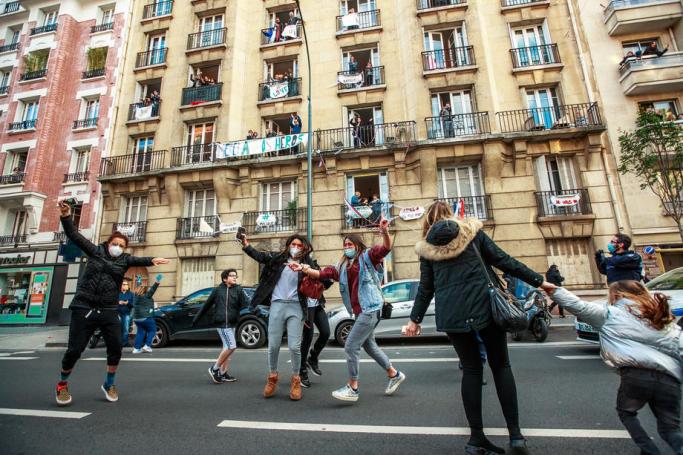More parts of Europe opened up on Friday as the world tried to get back on the road to recovery from coronavirus, despite fears of a second wave of the pandemic which has claimed more than 300,000 lives worldwide.
Borders were reopening and lockdowns continued to ease from Australia to Austria as governments move to rebuild the shattered economies of a planet that is learning to live under the shadow of the disease.
But the battle is far from won, with the virus continuing to ravage the United States and Russia and a report warning that a quarter of a billion Africans were at risk of being infected.
The catastrophic economic toll of the COVID-19 outbreak meanwhile became clearer than ever with the news that the virus had pushed Germany, Europe's powerhouse, into recession.
With a vaccine a year away at best and countries already squabbling over who will have access to it, governments are taking steps to try to return life to something like a semblance of normality.
- 'We missed it' –
Slovenia became the first European country to open its borders on Friday after declaring an end to its coronavirus epidemic, despite new infections still being reported.
Latvia, Lithuania and Estonia were set to create their own "Baltic bubble", allowing free movement among the three countries, while Austria and Germany were expected to open their shared border.
Austria has been a pioneer in ending lockdowns and took an important symbolic step on Friday with the reopening of its restaurants and iconic Viennese cafes.
"It's been hard for us that everything's been closed," said Fanny and Sophie, 19-year-old students waiting for breakfast at a cafe in the Austrian capital. "We missed it and we're going to come back as much as possible."
On the other side of the world, Sydney's bars and restaurants opened their doors to customers Friday as a weeks-long lockdown eased.
"The desire to sit in a place that is not your house with your mates and have a drink is truly overwhelming," said Chrissy Flanagan, owner of The Sausage Factory, a bistro in Australia's biggest city.
- 'Dead city' –
However France called for self-restraint as the country prepared for its first weekend since its lockdown was eased on Monday, warning that police would break up any large gatherings.
France also announced the first death of a child from an inflammatory condition believed to be linked to coronavirus, as similar child fatalities are being investigated in New York and London.
Germany was ready to relaunch its football championship, although in front of empty stadiums and under draconian health measures.
Augsburg coach Heiko Herrlich learned the hard way: he will miss Saturday's match because he went out to buy toothpaste in violation of his team's quarantine rules. "I made a mistake leaving the hotel," he said.
In badly-hit Italy, some beaches are reopening but the absence of tourists is still keenly felt, for example in the canal city of Venice, where even the pigeons have deserted the famed St Mark's Square.
"Without tourists, Venice is a dead city," said 66-year-old gondolier Mauro Sambo.
- 'Plague from China' –
In the United States, the world's worst-affected country with more than 85,000 deaths, President Donald Trump ramped up his war of words with Beijing over responsibility for what he has dubbed the "Plague from China", threatening to cut ties between the two countries.
The virus first emerged in the Chinese city of Wuhan late last year before spreading around the world, fuelled by air travel and a globalised economy.
Trump has been keen to deflect criticism from his own government's handling of the pandemic, with his re-election bid in November potentially at risk from the economic fallout.
The man formerly charged with developing a vaccine in the US, Rick Bright, told lawmakers the government in Washington has no "master plan" to fight the pandemic.
US retail sales plunged in April and new figures showed a further three million job losses, taking the newly unemployed to 36.5 million -- more than 10 percent of the population.
Meanwhile the Asian Development Bank on Friday doubled its previous estimate of the cost of the pandemic, saying the world economy would shrink by $8.8 trillion -- almost a tenth of global output.
The World Health Organization warned that Africa is a hotspot waiting to happen, despite so far having escaped the worst of the disease.
Researchers say fragile health systems on the world's poorest continent could quickly be overwhelmed, with modelling suggesting 231 million people could become infected and up to 190,000 could die.
There was also concern over the discovery of infections in the world's biggest refugee camp, in Bangladesh, where upwards of a million Rohingya Muslims from neighbouring Myanmar live in squalor.
"We are looking at the very real prospect that thousands of people may die from COVID-19" in these camps, Save The Children's Bangladesh health director Shamim Jahan said.
In the Philippines, a powerful storm forced tens of thousands of evacuees into cramped shelters, making social distancing nearly impossible.
"It's difficult to enforce because they are stressed. But we are doing our best," local police official Carlito Abriz told AFP.
AFP












